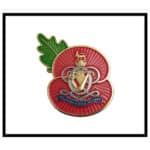Patrick Haddon Harvey Combe was born on August 21, 1912, at Aspley Guise, Bedfordshire, the son of a cavalry officer, and a member of the brewing family whose firm was eventually to become Watney, Combe and Reid. Young Pat was sent to Radley until the sudden death of his father required him to come home and take over as head of the family. Shortly afterwards, at the age of 18, he joined the Stock Exchange, beginning a career in the City.
As a pre-war reservist, he was commissioned at the outbreak of war into The 3rd The King’s Own Hussars. By his own account, he got off to a shaky start when he missed a ford on Salisbury Plain and submerged his first tank, much to the amusement of everyone who saw it, except his commanding officer.
Lt Col Pat Combe, who died aged 91, won an MC in Egypt in 1940, and was appointed OBE in 1944 for his services to Britain’s tank forces in the run-up to D-Day.
In December 1940 Combe, then a second lieutenant in The 3rd Hussars, which was part of 7th Armoured Division, took part in Operation Compass, Maj Gen O’Connor’s brilliant counter-stroke against the Italian forces which had invaded Egypt.
Designed as a five-day raid, Compass developed into a six week offensive which advanced 500 miles, capturing 130,000 prisoners, nearly 500 tanks and 800 guns; only the diversion of men and material to Greece prevented a further advance which might have ended the war in North Africa.
O’Connor’s offensive began with attacks on a line of fortresses that the Italians had established between Sidi Barrani on the coast, and Sofafi, 50 miles inland. As the 4th Indian Division captured these, the 7th Armoured Division, acting as a corps de chasse, raced towards Buq Buq – on the coast road between Sidi Barrani and the Libyan frontier – to cut off the Italian retreat.
The 3rd Hussars, equipped with light and cruiser tanks, were at the forefront of his advance. Near Buq Buq, Combe, who was commanding a troop in ‘C’ Squadron, saw ‘A’ Squadron’s attack on an Italian gun-line become bogged down in a salt marsh. The squadron was suffering heavy casualties from well-sited Italian artillery firing at point-blank range.
Seeing a wounded man running away from a knocked-out tank, Combe at once brought his own tank alongside the man and, disregarding the enemy fire, stood up in his turret, leaned over and hauled him aboard. As he did so, he was badly wounded himself, but continued to control and move his tank to a place where the fire was less severe and the wounded man could be attended to.
While his comrades advanced into Libya, Combe endured an agonising drive, lasting several days, to a hospital in Cairo; his wife was initially told that he was missing in action.
In Cairo, one of Combe’s lungs was removed and, as soon as he was fit enough, he was evacuated by sea to South Africa. For his gallantry under fire, he was awarded his Military Cross.
For many years after the war he claimed to resent the fact that the Italians had shot him in the back while he was rescuing the wounded man; but in the 1960s, when he got into difficulties while swimming in an Italian lake, his life was saved by an Italian swimmer, and Combe reckoned that the debt had been paid.
By the end of 1941, Combe was back in England. No longer fit for active service, he applied for an instructor’s post at Sandhurst; but, still weak from his wound, he fainted during the interview.
At last he was posted to the War Office, with responsibility for supplying the tank regiments with spare parts and new tanks.
In this role he played a major part in the preparations for the D-Day landings, personally visiting every such regiment and ensuring that they had all the necessary equipment. Such was his skill and technical know-how that, by the eve of D-Day, Combe was one of the few people who knew when the landings were to take place; his wife was long to remember his anxious tappings of the barometer in the days leading up to the invasion. For his part in the preparations he was awarded his OBE.
After demobilisation in 1945, Combe returned to the Stock Exchange, becoming a partner in Dolphin, Son and Fisher (later to become Wontner Dolphin, and now Brewin Dolphin).
Retiring from the City in 1975, and remembering the care he had received in hospital in Cairo, Combe devoted his time to the Red Cross, becoming president of the Sussex section, and a patron of the charity.
He was also, in the 1980s, a founder member of Activenture, a charity which provides adventure holidays for the disabled at an outdoor centre in the village of Wych Cross, East Sussex.
As a lifelong cricket fan, he spent much of his leisure time at Hove watching Sussex striving to win the County Championship. When they did so in his last summer, Combe said that he could now die happy.
His last days were crowned by England’s Rugby World Cup victory, though he was devastated when the Sussex Red Cross asked him to open a centre in Brighton at 11am on the day of the final. In the event, duty came first, and Combe asked his son to record the second half of the match on video.



